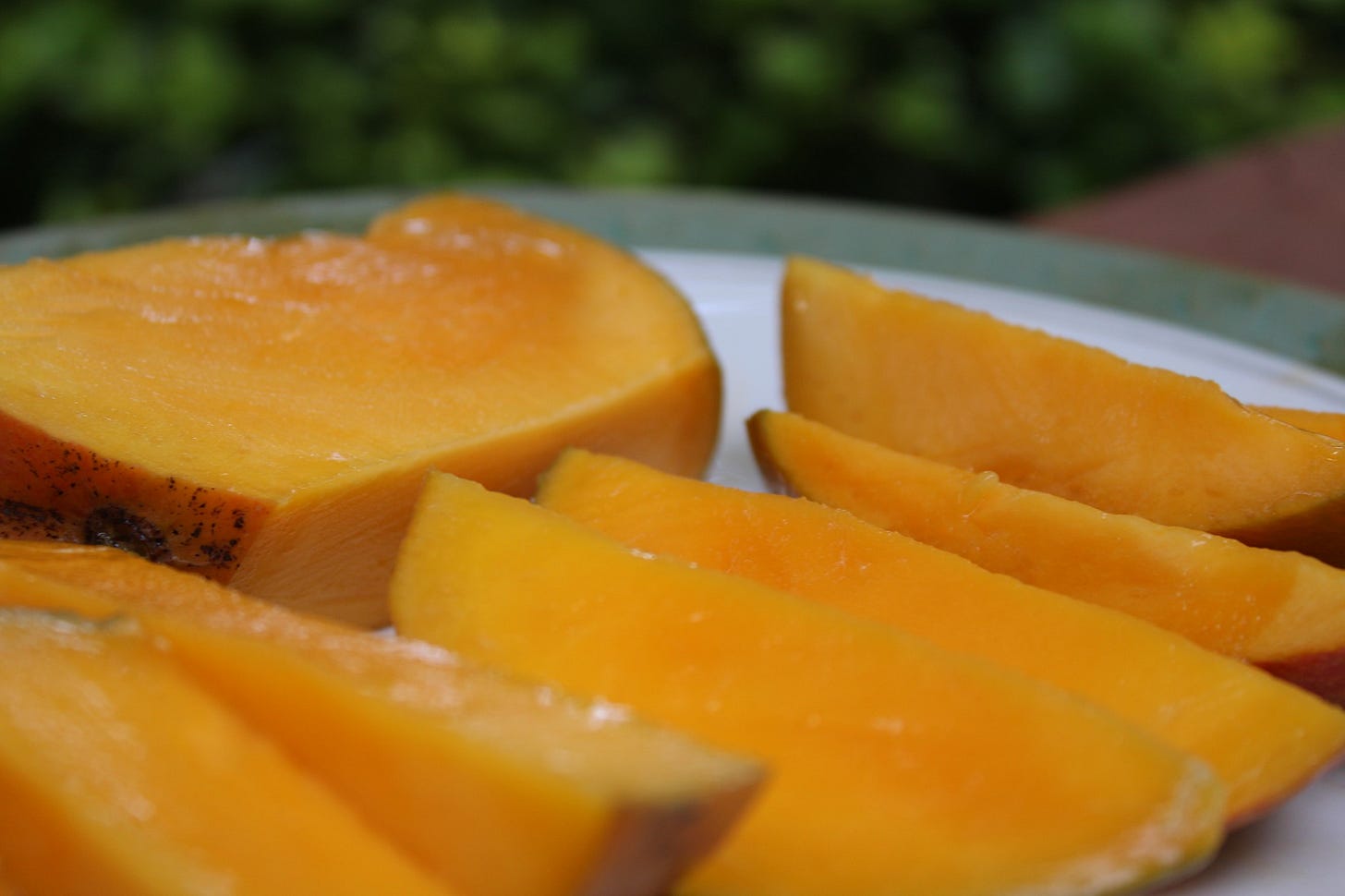What I learned about mangoes this week.
A search for subcontinental mangoes in Atlanta leads to...another test in patience, brought to you by your truly, COVID.
My five year old son has sandy brown hair and peachy skin and you would never know he had South Asian roots unless...you saw him eat a mango.
First, there is silence. The usual little boy chatter and bickering of our home ceases. He closes his eyes. Bites into a piece. I place a paper towel roll next to him, in a futile attempt to contain the flood of mango juices that ensues. Marigold colored streams run down his fingers, his mouth. He is channeling and experiencing something on a higher plane - perhaps invoking the spirit of his great, great grandfather in Punjab, where mangos grew bountifully and in the hierarchy of life, were second only to immediate family.
Mangoes bring joy to our home - except when it comes to the big middle piece, the pit of the mango with all the flesh around it. I manage to cut most things in equal halves (gummies, hard candies, popsicles) to keep the kids from killing each other. But this is impossible with this coveted piece. Who gets to eat it is a question of timing, destiny, and parental skill. I once settled an epic battle by gripping the slippery pit with both my hands, wrist muscles flexing, letting them each take one greedy, desperate bite at a time.
This passion isn’t unusual. There’s a direct link between the happiness of South Asians and mangoes, even though I don’t have an NIH study to prove that (just yet…I plan to email them about this).
At a time when the pandemic feels endless, the weather is weird, and headlines from Afghanistan are making our stomachs do somersaults, it’s natural for us to turn to mangoes for hope.
My kids have never tried the mangoes from India or Pakistan. They eat U.S. supermarket mangoes, which are 90 percent of the time, from Mexico, Peru, or Brazil. Indian mangoes make up less than a quarter of one percent of the U.S.’s mango supply. Pakistani mangoes are even harder to find. Which makes them that much more special.
To lift us out of the general pandemic doldrums, I wanted to blow the kids’ minds with a subcontinental mango.
So I called the local Indian grocery store to check if they had the famed Indian Alphonso mango, aka the “king of mangoes” (though most Pakistanis would argue the title belongs to their native Chaunsa mango). A man answered.
“Do you have Indian mangoes?” I asked.
The response was angry. “No, ma’am. Corona!” Corona? I dialed the number for Cherians grocery store in Decatur. The woman who answered let me down more gently, saying they would have mangoes “next year ma’am.”
A trip to both grocery stores confirmed what I had hoped was untrue - they only had green unripe taut-skinned Mexican mangoes. Some of these even had ominous black spots on them.
These were the mangoes staring back at me at the local Indian grocery store.
I came home with a box of Dabur Real Alphonso Mango Fruit Juice nectar (22% Alphonso Mango Pulp), Parle-G biscuits, and a ripe papaya (good for digestion).
And placing the blame on Corona was accurate. Mango season is over and imports from India have been suspended since the start of the pandemic. That’s because USDA inspectors haven’t been able to travel to India to do the required pre-clearance work for importing mangoes - something called irradiation. Basically, a USDA inspector has to go to mango facilities in India to make sure they’re exposed to gamma radiation to kill off any bugs or pests, before the mangoes can be sent to the U.S.
I moved on. Mango season might be over, but I could be prepared for next year. I messaged my cousin who procures Pakistani Chaunsa mangoes through a Whatsapp dealer. He shared his contact with me - a person saved in his phone as Pakistani Mangoes. I sent Pakistani Mangoes a message, asking him about the availability of Chaunsas in the U.S. Pakistani Mangoes responded, saying the season was over and that importing the mangoes was a “very long and risky process.” But, he could add me to the list for next year. I was then added to a Whatsapp group called “Phalwaala Atlanta Mangoe.”
I was alarmed when Pakistani Mangoes switched from WhatsApp to text and sent me this message (he just needed info to put me on the relevant list though!).
So yes, even though the weather would make you think otherwise, mango season is over. I’m holding out hope for next year. My dream for 2022 - the worst of the pandemic will be over, COVID restrictions lifted, my kids, nephews, nieces and parents will be sitting together at our kitchen table, blindfolded with an Indian, Pakistani and ordinary supermarket mango in front of them. And we’ll have the ultimate mango taste test.
Until then, sipping on Alphonso Mango Fruit Juice and eating two dollar mango kulfis outside of Gokul Sweets will have to suffice.
After my failed attempt to get an Indian or Pakistani mango, I treated my five year old son to a mango kulfi outside Gokul Sweets in Decatur. Even though he's never tasted one he said, "they taste like Pakistani mangoes."








